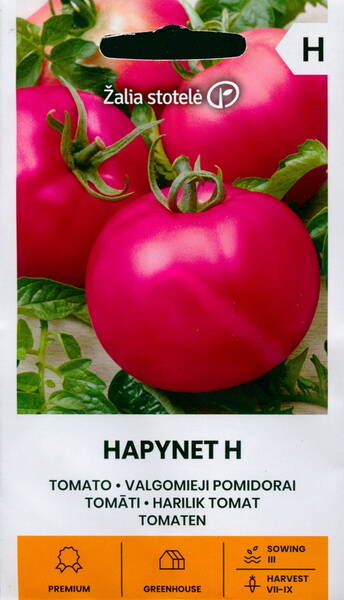Determinate, disease-resistant, raspberry-type tomato hybrid. Grown outdoors. Plants are sturdy, and high-yielding even under unfavourable weather conditions.
Fruits are round, slightly flat, fleshy, and delicious, weighing 190-230 g or even over 300 g. Consumed fresh, suitable for salads or sandwiches.
* How to increase the number of ovaries in tomatoes.
The number of ovaries in tomatoes, first of all, depends on the complete nutrition of the plants. If the tomatoes show signs of starvation, a lack of certain elements, then there will be few ovaries, they will fall off or develop poorly, producing small and tasteless fruits.
The main elements for the nutrition of tomatoes are potassium and phosphorus, so it is with them that you should do top dressing during flowering. Potassium-phosphorus top dressing is best done under the root.
An important factor affecting the number of ovaries is temperature. The best temperature for setting tomatoes is 20 - 25 degrees. Tomato is a heat-loving plant and at lower temperatures all its growth processes slow down, and the ovaries can fall off. High temperatures are harmful to tomato pollen, the pollen is sterilized and when it gets on the pistil, it does not germinate and the ovary is not formed. Therefore, it is necessary to ventilate the greenhouse and shade it on particularly hot days.
Humidity is also important for tomato setting. If the humidity is too low, the air is too dry, tomato pollen dries out and tomato setting does not occur. If the humidity is too high, the pollen collects in lumps and pollination cannot occur. Therefore, it is better to leave greenhouses open at night during warm weather so as not to increase the humidity too much.
Light shaking of tomato plants helps to increase the number of tomato ovaries. It is best to do this in the morning.
Boric acid is an important microelement for tomato setting. Spraying with boron (1/2 teaspoon per 10 liters of water) is carried out in the morning or evening from above on the tier of brushes with flowers and ovaries that has not yet been treated with boron.
There are also special preparations, such as "Zavjaz" (Ovary) and "Buton" (Bud), but they contain gibberellic acids, which delay the ripening of tomatoes that have already set. When treating with these preparations, you should try to spray only on the flowers, avoiding the already growing fruits.















